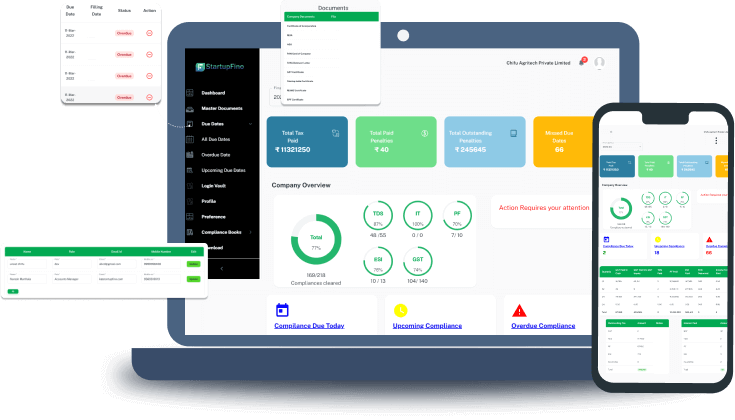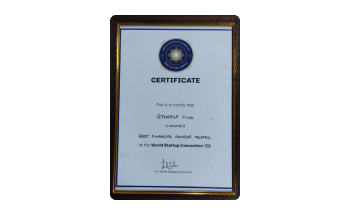The Food Safety and Standards Authority of India is the main agency dedicated to enforcing food safety regulations. Its main goal is to develop comprehensive guidelines and norms that promote awareness of food safety throughout India. FSSAI actively monitors entities across the food supply chain, meticulously overseeing processes from production to retail.
Emphasising consumer awareness as a top priority, FSSAI consistently launches initiatives to keep the public well-informed about substandard and low-quality food items. This commitment reflects the agency's dedication to ensuring that citizens make informed choices regarding the food they consume. In alignment with the Food Safety and Standards Act of 2006, FSSAI formulates important food safety norms and guidelines.
For Food Business Operators with a turnover exceeding Rs. 20 Crores or those engaged in the import and export of food products in India, obtaining the FSSAI Central Licence is essential.
Fundamental Duties and Functions of the Food Safety and Standards Authority of India
The major duties of the FSSAI include the following:
- Formulation of Guidelines and Norms for Food Safety and Hygiene:
The FSSAI plays an important role in developing comprehensive guidelines and norms to ensure food safety and hygiene standards are maintained across the nation.
- Nationwide Initiatives for Food Safety Awareness:
FSSAI takes the lead in launching initiatives on a national scale to raise awareness about food safety among the general public, aiming to educate and inform the masses.
- Granting Mandatory Food Licence and Registration:
FSSAI is responsible for the mandatory issuance of food licences and registrations to operators in the food business, ensuring compliance with regulatory standards.
- Facilitating Recommendations to the Government of India:
The authority actively contributes by providing recommendations to the Government of India, aiding in the formulation of new policies related to food safety and standards.
- Rolling Out Directions and Guidelines in Accordance with FSS Act, 2006:
FSSAI exercises its mandate by issuing clear directions and guidelines aligned with the provisions of the Food Safety and Standards Act, 2006, specifically tailored for entities operating in the food sector.
- Legal Actions Against Food Businesses Involved in Illicit Practices:
The FSSAI takes legal measures against food businesses suspected or proven to be engaged in illicit practices such as food adulteration, ensuring accountability and adherence to food safety regulations.
Features of FSSAI Central Licence
The Central FSSAI Licence, an important requirement for food businesses operating at a central level, includes various features that contribute to the regulation and enhancement of food safety standards:
- Mandatory for Central-Level Operations:
The FSSAI Licence is obligatory for food businesses engaged in central-level activities, including imports, exports and inter-state trade.
Valid for a period of five years, the Central FSSAI Licence can be renewed upon expiration, ensuring continuous compliance with food safety regulations.
- Detailed Application Process:
The application process for the Central FSSAI Licence involves a comprehensive submission of relevant documents. These may include food safety management plans, laboratory test reports and proof of financial stability.
The licence is issued by the Food Safety and Standards Authority of India, a government body responsible for regulating and ensuring the safety and quality of food products in India.
- Adherence to Regulations and Guidelines:
The Central FSSAI Licence holders are obligated to adhere to the food safety regulations and guidelines set by the FSSAI. Periodic inspections are conducted to ensure ongoing compliance.
- Display of Licence Number:
FSSAI Central Licence holders are required to prominently display the FSSAI licence number on all food packages and advertising materials. This transparency reinforces consumer confidence.
- Eligibility for Export Promotion Schemes:
Licence holders enjoy eligibility to participate in various export promotion schemes, promoting international trade opportunities. They can also actively engage in international trade fairs and exhibitions.
Businesses Requiring Mandatory FSSAI Licence
The Food Safety and Standards Authority of India mandates the registration of a licence for various businesses to ensure compliance with food safety regulations. The following types of businesses fall under this requirement:
- Restaurants
- E-Commerce Businesses, including Online Home Kitchens
- Businesses Selling Essential Food Products
- Food Business Operators of the Indian Railways
- Businesses Selling Coffee or Coffee-Based Products
- Manufacturers of Powdered Tea
- Food Vending Machines
- Businesses Selling Herbalife-Based Products
- Food Business Operators Involved in Import or Export of Food Products
- Food Business Operators of the Indian Airports
- Food Marketing Companies
- Businesses Exporting Cashews
- Amazon Warehouses
- Hotels
- Supermarkets
- E-Commerce Businesses Selling Prepared Food Online (ex., Zomato, Uber Eats and Swiggy etc.)
- E-Commerce Businesses Selling Food Products Online
- Online Businesses Selling Packaged Commodities (ex., Flipkart, Amazon, etc.)
- Catering Businesses
- Event Management Businesses
- Colleges and Institutions with Canteens
- Businesses Involved in Retail, Export or Import of Fisheries
- Agricultural Products Businesses
- Manufacturers of Packaged Products
- Manufacturers of Various Types of Oil
- Food Outlets
- Hospitals
- Manufacturers of Packaged Drinking Water
- Businesses Involved in Retail, Export or Import of Dairy Products
- Manufacturers of Chocolate and Chocolate-Based Products
- Food Transporters
- Re-Packagers
- Milk Chilling Units
- All Types of Food Business Operators
Benefits of Obtaining an FSSAI Central Licence
In addition to ensuring compliance with food safety regulations, obtaining a Central FSSAI Licence offers various advantages for businesses, including:
The FSSAI Licence serves as a global recognition tool, establishing the business's reputation on an international scale and creating a recognisable brand name.
Holding a Central FSSAI Licence facilitates smooth expansion of the food business to new locations and the opening of additional outlets. It also enhances the business's eligibility for loans and other funding, supporting overall development.
The FSSAI Licence provides a sense of security and legal legitimacy for individuals involved in the food business. It acts as evidence that the quality of food meets safety standards, offering protection against legal challenges.
In an era where consumers are increasingly conscious of food quality, having an FSSAI Licence gives businesses a competitive edge. It instils confidence in consumers regarding the adherence of the business to stringent safety and quality standards.
- Enhanced Market Credibility:
The Central FSSAI Licence enhances the credibility of the business in the market, showcasing its commitment to delivering safe and high-quality food products. This, in turn, attracts more customers and builds trust among stakeholders.
Businesses with Central FSSAI Licence gain access to new markets, both domestic and international, as it serves as a prerequisite for export and import activities. This opens up opportunities for diversification and increased market reach.
The FSSAI Licence simplifies the process of exporting food products, as it is often a mandatory requirement for international trade. This facilitates smoother operations in the global market.
Having the Central FSSAI Licence mitigates the risk of legal and financial consequences associated with non-compliance. It demonstrates a commitment to adhering to food safety standards, reducing the likelihood of regulatory issues.
- Consumer Trust and Loyalty:
Businesses with Central FSSAI Licence instil trust and loyalty among consumers, as they perceive the certification as a guarantee of product quality and safety. This can contribute to long-term customer relationships and positive brand image.
In a competitive market, a FSSAI Central Licence provides a distinct competitive advantage by differentiating the business as one committed to the highest standards of food safety and hygiene.
Essential Criteria for Obtaining FSSAI Central Licence
To secure a Central FSSAI Licence, food businesses must meet specific criteria, demonstrating their commitment to adhering to food safety standards. The essential criteria include:
- Annual Turnover Exceeding Rs 20 Crores:
Food businesses with an annual turnover surpassing Rs 20 crores are required to obtain a Central FSSAI Licence.
- Operations in Multiple States:
Businesses with various units operating in multiple states fall under the purview of the FSSAI Central Licence.
- Production Beyond Prescribed Threshold:
Entities engaged in monthly or annual production exceeding the prescribed threshold limit are mandated to obtain the Central FSSAI Licence.
- Import/Export Business with Annual Turnover Above Rs 20 Crores:
Individuals intending to commence import/export activities of food items or establish a business for selling food items on their own e-commerce website must have an annual turnover exceeding Rs 20 crores to qualify for the Central FSSAI Licence.
Special Conditions for Applying for FSSAI Central Licence:
In addition to the general criteria, there are specific conditions that warrant the application for a Central FSSAI Licence. These include:
- Establishment of Nutraceutical and Health Supplement Business:
Businesses involved in the production and distribution of nutraceuticals and health supplements are required to apply for the Central FSSAI Licence.
- Transportation Business with Over 100 Vehicles:
Businesses engaged in the transportation of food products and operating a fleet of more than 100 vehicles are subject to obtaining the FSSAI Central Licence.
- Operation of 5-Star or 7-Star Hotels:
Hotels rated as 5-star or 7-star establishments are obligated to apply for and obtain the Central FSSAI Licence to ensure compliance with food safety regulations.
Additional Criteria Covered by FSSAI Central Licence
In addition to the previously mentioned essential criteria, the Central FSSAI Licence includes a broader range of criteria, reflecting the diverse nature of the food industry. These additional criteria include:
Annual production of milk solids reaching 50,000 litres or 2,500 megatons.
- Vegetable Oil Processing Facilities:
Daily production volume of vegetable oil at 2 MT.
Daily capacity for slaughtering:
- 1,000 poultry birds.
- 150 small animals
- 50 large animals
- Meat Processing Facilities:
Daily production capacity of 50 KG or 150 megatons.
- Food Processing Facilities:
Daily production of 2 megatons.
- Exporting Food Articles Abroad:
Businesses involved in shipping food articles internationally.
- Refrigeration or Cold Storage Facilities:
Facilities with a storage capacity of 1,000 megatons or more.
Yearly turnover exceeding Rs 30 crores for wholesalers engaged in the food business.
- Retailers & Distributors:
Annual turnover surpassing Rs 20 crores for retailers and distributors of food articles.
- Catering Services or Food Marketing Businesses:
Yearly turnover exceeding Rs 20 crores for businesses involved in catering services or food marketing.
- Restaurants and Eating Houses:
Annual turnover of Rs 20 crores for restaurants and eating houses.
- Food Catering Services in Government-Based Agencies:
Catering services operating in government establishments, including seaports, airports, etc.
Documents Required for FSSAI Central Licence Application
To initiate the application process for the FSSAI Central Licence, the following fundamental documents need to be submitted along with the application:
Duly filled and signed by the applicant.
Layout of the production or processing facility, including accurate measurements of critical areas.
- Key Management Personnel Details:
For companies, a complete list of key management personnel, including names and residential proof.
Copy of Memorandum of Association, Articles of Association and Certificate of Incorporation, if the applicant is a private limited company, One Person Company or public limited company.
- Partnership Firm Documents:
For partnership firms, a complete list of partners with names, contact details, addresses, etc., along with a copy of the partnership deed.
- Co-operative Society Documents:
List of serving members in a co-operative society, if applicable.
Copy of the trust deed and record of trustees for registered trusts.
Utility bills (electricity bill, rent agreement, registry) for the business place.
- Food Safety Management Plan:
Documentation outlining the Food Safety Management Plan or an equivalent protocol.
Names and a list of machines present at the production or processing plant.
List of active raw material suppliers.
- No Objection Certificate:
NOC from concerned local authorities.
Tourism certificate from the Ministry of Tourism for hotel owners, if applicable.
Import Export Code certificate from the Directorate General of Foreign Trade for businesses intending to export food articles abroad.
- Import Export Code Declaration:
Declaration in case of turnover exceeding Rs. 20 crores, specifically for businesses involved in import-export activities.
Procedure to Obtain FSSAI Central Licence
Securing the Central FSSAI Licence involves a systematic process. Given below is the process for obtaining the licence:
Step 1: Application Filing Via Form B
The licence seeker initiates the process by filing Form B with the licencing authority. During this step, the applicant must adhere to the basic turnover criteria.
Step 2: Applicant Scrutiny by FSSAI Officials
The submitted application, along with the required documents, undergoes in-depth scrutiny by FSSAI officials. This step ensures that all necessary information is provided and meets the regulatory standards.
Step 3: On-Site Inspection by FSSAI's Official at the Business Place
FSSAI sends designated officials to conduct an on-site inspection of the business place. This visit aims to assess the level of compliance with the standards recommended by FSSAI. Non-conformities discovered during this inspection may pose a risk of application cancellation.
Step 4: Approval of Application and Grant of Licence
Upon approval by the licencing authority, the application receives the green light and the FSSAI Central Licence is granted. The certificate is then issued to the licence seeker within a few days. With the certification in hand, the business owner is authorised to commence full-scale operations.
Note: Displaying the Certificate at the Business Place
It is mandatory for the licence holder to prominently display the FSSAI Central Licence certificate at the business place. This ensures transparency and compliance with legal requirements.
Validity and Renewal of FSSAI Central Licence
The Central FSSAI licence has a flexible validity period ranging from 1 to 5 years, with the cost of the licence increasing based on the chosen duration. Renewal is an important aspect and it should be done before the expiration date to avoid penalties.
Validity Duration:
The Central FSSAI licence is issued with a validity duration that ranges from 1 to 5 years.
The cost of the licence is influenced by the chosen validity period.
Renewal Process:
The FSSAI Central Licence should be renewed before the 30 days of the expiration date to avoid penalties.
Renewal Application Documents:
When filing for renewal, the applicant needs to upload the following documents:
- Passport Size Photograph:
Recent passport-sized photograph of the applicant.
Proof of identity such as Aadhaar Card, Voter ID, etc.
Copy of the PAN Card.
Submission of address proof, which may include telephone bills, electricity bills, etc.
Copy of the land deed or agreement as proof of ownership.
If the premises are rented, the applicant must submit a copy of the rental agreement and a No Objection Certificate from the landlord.
Consequences and Penalties for Non-Compliance with FSSAI Regulations
Individuals or entities authorised or approved by the Food Safety and Standards Authority of India are obligated to adhere to the rules and regulations outlined in the Food Safety and Standards Act of 2006. Non-compliance can result in various consequences and penalties, as given below:
Compliance Evaluation:
The food safety officer conducts inspections using a checklist and categorises the compliance as:
- Compliance (C)
- Non-compliance (NC)
- Partial compliance (CP)
- Not observed/Not applicable (NA).
Penalties for Non-Compliance with Food Safety and Standards Act:
Given below are the penalties for non-compliance with the central licence:
Fine of Rs.25,000 for a small manufacturer with Rs.2 lakh turnover if the food quality does not comply with the Act.
Fine of Rs.5 lakhs for food that falls below standards.
Fine of Rs.3 lakhs for misbranded foods.
Fine of Rs.10 lakhs for inaccurate representation of the product or deceptive advertising.
- Non-Compliance with FSO's Instructions:
Penalty of Rs.2 lakhs for non-compliance with Food Safety Officer's instructions.
- Unhygienic Manufacturing/Processing:
Fine of Rs.1 lakh for unhygienic manufacturing or processing.
Fine of Rs.1 crore for extraneous food items.
Penalties for Operating Without FSSAI Licence:
Individuals or entities conducting food business operations without acquiring an FSSAI licence may face imprisonment of up to six months and a fine.
Penalties for Sub-Standard Food Articles:
Selling substandard quality of food and violating compliance requirements may result in a fine.
Penalties for Food Items Below Specified Standard:
Selling lower quality food and violating enforcement criteria may lead to a fine. Owners or companies exempted for non-compliance under section 31(2) of the Act are also liable for a penalty.
Penalties for Faulty Branding:
Producing, storing, selling, distributing or importing misbranded food products can result in a fine. The individual or business may need to either destroy the items or take immediate corrective measures.
Penalties for Food Items Containing Unwanted or Foreign Matter:
Manufacturing, selling or importing food products containing extraneous or foreign matter can lead to a fine.
Why Choose StartupFino for FSSAI Central Licence in India?
StartupFino is a company that specialises in offering complete services for FSSAI Central Licence. We can help you with everything from providing advice in the initial phase to ensuring that you meet all the necessary requirements and compliances for your licence and registration.Ensuring timely renewal and submission of the essentials is important for the continued validity of the FSSAI Central Licence. It not only maintains compliance with food safety regulations but also avoids penalties associated with delayed renewal.
Maintaining compliance with FSSAI regulations is important for safeguarding consumer health and safety and adherence can help businesses avoid severe legal consequences and penalties. Consultation with professionals like StartupFino is recommended for any questions related to regulations or potential non-compliance consequences.































































